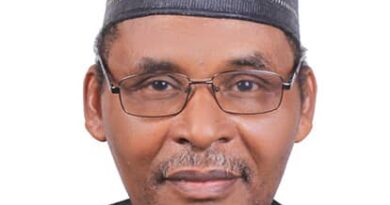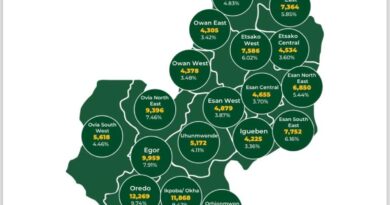Artificial Intelligence, others: Setting agenda for the future of work, By Jaye Gaskia
Artificial Intelligence: Context – The World Of Work: It is important to begin by affirming the centrality of work to humanity. Work is the most significant attribute and defining character of the Human Being, in addition to the ability to think, to reflect, and to communicate.
These attributes are the characteristics that set the human being apart from the rest of nature, and that have shaped the evolution of human civilisation.
Work is the conscious activity, of a physical and mental nature [that is involving the use of our limbs and of our brain, the unity of limbs and the nervous system], undertaken by the human being in order to meet his or her needs, to eat, to protect the body, to have shelter, to move around, to produce goods and services, and to distribute and exchange these goods and services.
But work by its very nature is social, it is something that requires the participation of several other human beings, even as it is purposed towards meeting the needs of several human beings.
Humans are not the first or only animals to live together, and to undertake collective activities, including hunting, feeding, and bringing up the young together. Lions, Elephants, cattle, penguins, etc also do this. What is different with the human collective, is that it is also social, it is deliberate, it is conscious, and the process is also subject to change and transformation.
This is why, it is a fact that not only is work a defining attribute of the human species, the world of work is central to the initiation and evolution, to the development of human civilisation.
But in order to work, that is to act on nature and other processes in a manner that enables us fashion out products and deliver services that nurture our civilisation, we consciously fashion out tools, equipment, etc to enable us realise the objective and purpose of work; while also consciously developing built environment for the utilisation of the tools, and the organisation of work. The human being is thus, essentially a working being, a being defined and shaped by work.
In order to live and to thrive, the human species as a collective must engage in work; in order to work, the human being fashions out tools to aid the process of work, and develop and improve our capacity to work – the labour process [the means of production]; and in order to improve our condition of living and existence, the human being must constantly refine the tools with which work [the means of production] is undertaken, as well as constantly refine the process and system of the organisation of work [relations of production].
In order to produce [including distribution and exchange of the goods and services produced], human beings enter into relationship with nature, and with one another. Human beings act on the natural environment and exploit resources found in nature, in order to produce [and distribute and exchange] the goods and services that humanity needs.
It is this necessity to constantly refine the means of production, and constantly improve the process and organisation of work, of the production process, that has driven the development of technologies, and that has made possible the emergence of Artificial Intelligence, digital innovations and continuing technological advancements. The changes in the character and quality of the tools, equipment etc required for the work process, that is in the means of production; also in turn impacts, and shapes work, and the organisation of the work process. The relationship between the means of working, and the process of working is thus dialectical, and mutually reinforcing.
The human being whose labour [physical and mental – there is no such thing as purely physical, or purely mental work or labour, even though there may be the preponderance of one over the other] is required to make and utilise the tools, and whose labour is required to utilise the tools to produce [and distribute and exchange] goods and services, is in turn shaped by these processes.
The ability of the labourer to realise the full benefits of his or her labour is however shaped and conditioned by the character of the relations of production, that is by the fact that he or she is not the owner of the means of production, and that the owner of the means of production takes the lion share of the product of his or her labour as profit.
Artificial Intelligence [AI]:
What is artificial intelligence? This is essentially artificial intelligence [AI] is the simulation of human intelligence abilities and capabilities by machines, software, and other products of the mental and physical labour of human beings. In essence, AI is the simulation of human intelligence by things that are themselves the products of human intelligence, but are external to the human body.
AI, like technology and tool, is like a double-edged sword; it can be utilised for positive and or negative purposes, and it has very tremendous problem-solving potential.
Because it is a product of the human civilisation as it is, and as it is evolving, it also has an inherent tendency to reproduce, and amplify the inequalities in our society. The algorithms utilised often reflect existing biases and as such merely tend to reproduce and amplify these biases.
One of the biggest challenges with AI, in addition to the reproduction and amplification of biases and inequalities that drive and shape social injustices; is also the potential in the long run to impact and under develop the capacity of the human intellect, thus enabling the gradual atrophy of the human brain and human intelligence. As the use of AI becomes more ubiquitous and pervasive, it may lead to a situation where fewer and fewer humans are required to utilise their human intelligence, and more and more humans become less reliant on their own intelligence, and more dependent on AI. The end result maybe the evolution of separate subspecies of the human being – a super intelligent subspecies, separating from, and lording it over a subspecies with increasingly mundane and declining levels of intelligence.
Associated with this is the tendency for the separation of the super intelligent subspecies from the subspecies with mundane intelligence to reflect existing inequalities of race, nations, gender, and poverty among others.
This outcome, it is true is an extreme scenario, but it is neither implausible nor impossible. Nevertheless, incipient manifestations of this tendency are already emergent. By the very nature of the algorithms with respect to intellectual searches and knowledge generation, those who have the privilege to write regularly and to be published, and who have been most favoured with respect to public discourses and communication, are the ones whose works are favoured by the algorithms of the Ais, and they are essentially mostly white, male, and upper class, and are mainly based in, or from the hemispheric North.
Knowledge produced and generated from Africans in Africa, or from workers and workers intellectuals, are often missing in this mix and are overlooked by the algorithms.
Unless the class character of human society is changed, AI will simply serve and reflect the interests of the ruling classes, and to the exclusion of the interests of the working classes, and other exploited, oppressed and marginalised groups like racial, ethnic and religious minorities; and reflect and amplify the divides between and within countries and continents.
Only in the context of the class struggle, and on the basis of the fightback and vigilance of the working class and other oppressed groups, will AI become ultimately beneficial for humanity as a whole.
AI has tremendous capacity to improve work, the work process, and the organisation of the work process, but this is only a potential, and one that can only be realised and activated in the context of the nature and character of the relations of production, and ultimately in context of the balance of social forces in the class struggle, and through the vigilance and the active contestation of the worker, the working class, and the organisations of the workers.
Digital Innovations:
Digital innovation involves the development and deployment of new digital technologies to improve organisational processes of entities, including improving the ways and manners by which systems and processes function and operate in order to maximise benefits of and from the operations of the entities. They are often software and internet and web-based applications and technologies.
Essentially, therefore these are technologies developed, designed and deployed to improve work, the work process, and the organisation of the work process. Therefore, ensuring that these improvements will be beneficial to the worker, and the working class will require the active organised self-agency of the worker.
Technological Advancements:
Technological advancements are improvements and advances in technology in general. It can be said that there is a general tendency towards improvements in technology, and advances in new technologies that are deployed in the process of work.
From the dawn of humanity, from the earliest times the human species have found that it has had not only to develop and deploy tools and technologies in the process of work, but also that it has to be engaged in a process of constantly improving these technologies and tools, and developing and deploying even new technologies and tools in the work process.
From the hunter-gatherer society, to the present modern capitalist civilisation, this trend to improve the tools for working, the process of work, and the organisation of the work process has been ever present, and has been the principal basis and driver of the development of humanity and the human civilisation.
Take the provision of shelter for instance, from fashioning shelter from wood, leaves, grasses, and hiding in caves, through building thatched huts, mud huts, brick houses, to the skyscrapers of huge mansions of the 21st century, the tools and the technologies to fashion shelter have improved over several thousands of years.
Humanity has moved from the using animals to pull ploughs to the development and deployment of giant tractors and combined harvesters; just as humanity has moved from using animals for transport through animal drawn wheeled carriages, the locomotive [train], the first automobiles, to the modern airplanes, modern speed trains, modern automobiles, and even to the rockets for space travel; or from rough rafts, through canoes, motor powered boats, to the modern ships and ocean liners of today, for water transport.. To support transportation and the changes in transportation, not only the vehicles, but also support systems for the vehicles, roads, airports, seaports, waterways, among others, have also all had to be transformed in tandem.
And again, as it is with AI or Digital Innovations, Technological Advancements have and continue to transform work, the way we work, the process of work, and the organisation of the process of work. Whether the worker, will be able to reap the most benefit from these transformations is again dependent on the class character of society, on the nature of the ownership of the means of production, and on the nature of the relations of production. Ultimately therefore, improvements in the conditions of the worker is dependent on the balance of forces in the class struggle, and the quality and character of the organised active self-agency of the worker and the working class.
Conclusion – Setting Agenda For The Future Of Work:
Given the present level of the development of the means of production, achievements in the development and deployment of AI, Digital Innovations, and Technological Advancements, it should be possible for work to be made easier, more rewarding, more ennobling, and more uplifting; and for the world of work to become less stressful, and less suffocating.
Writing in the 19th century, Marx and Engels, the founders of Marxism had expressed the aspiration that under socialism, work would be freed of all drudgery, and become more fulfilling; but also that the worker would have more time for leisure, for study, for relaxation, and to engage in all the other pursuits that give meaning and purpose to human existence. For this to happen, the length of the workday and work week would need to be reduced considerably, they had opined.
Well, today, humanity has reached a point in the level of development of the instruments of labour, such that it is possible to finally realise the aspiration of shorter work days, shorter work week, and full employment, with improved remunerations and conditions.
Certainly, if these new tools and improvements in the instruments of labour, it should be possible to have 5-to-6-hour workdays, a 3-day workweek, without job losses, and with not reduction in remunerations.
Organising the work process under these new conditions of shorter work days and work weeks, and with the goal of full employment will require working in shifts, such that there is no day from Monday through Saturday work is not taking place, and no time of the day say over a 12-hour period that work is not going on; however no single worker will have to work for more that 6 hours in a day, and for more than three days in a given week. Work can thus be organised in batches, with batches of workers working in shifts.
This should be the agenda of the organised working class for this period in our history. A call to rally and organise all workers in formal and informal sectors; to initiate conversations about and around AI, Digital innovations, Technological advancements, their impact on work and the worker, and their potential to qualitatively transform the conditions of the worker and the quality of the world of work; while raising the demand For Shorter Work Day [A Six-hour work day]; Shorter Work Week [A three-day work week]; and Full Employment!
Humanity has both the resources and the mechanism in place to make this happen today. The only barrier to this is the class character of the ownership of the means of production, and exploitation that is inherent to capitalism. Ideally, only a transformation in the nature of ownership of the means of production, and in the relations of production in general, that is the supplanting of capitalism with socialism can guarantee the change being proposed.
Nevertheless, through the organised active self-agency of the workers and the working class, the balance of forces in the class struggle can be shifted in favour of the working class, the class can achieve these demands, if not fully, at least in fundamentally significant measure, and set the trajectory implacably on a transitional path towards this end.
As the examples of the current struggle and strikes by United Auto Workers against the automobile industry in the US, and the recent strike that hit Nollywood have shown, not only do we need to engage with these processes around introduction of new technologies etc, and not only is this the right time to engage, we can also win.




